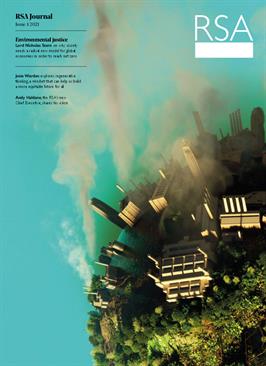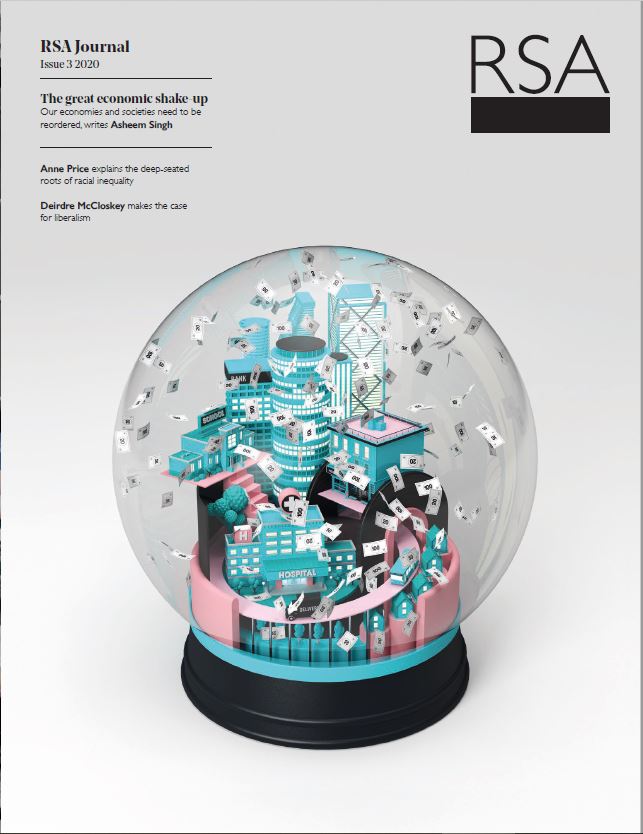In this issue:
We focus on environmental justice.
“COP26 needs to be a turning point that precipitates the whole-system change we need”
As this issue of RSA Journal goes to press, world leaders are gathering in Glasgow for the UN Climate Change Conference, COP26. Climate change is the big existential challenge of our time and must be matched by the scale of our global response. This summit needs to be a turning point that precipitates the momentum for the whole-system change that we so urgently need. Many of those within the RSA’s global network of Fellows are already active and engaged in these issues and with wider issues of environmental degradation.
In this issue we explore the bold thinking and radical action needed at this critical juncture. Lord Nicholas Stern, former World Bank economist and author of the 2006 game-changing The Economics of Climate Change: The Stern Review, offers his expert insights on how we set about realigning world economies and make the seismic shift needed to our economic models. He also offers some hope.
At the RSA we are acutely aware that the goal of net zero carbon by 2050, as stated in the 2015 Paris Climate Agreement, is not enough by itself and that we need to rethink our economy and the way we consume. While all of our work is informed by this, one of our core programmes, Regenerative Futures, brings together people and ideas with the aim of helping to create a world where communities harness their potential to be sources of health and regeneration for all life on earth. The RSA’s Josie Warden sets out the need for a change in mindset and what regenerative thinking means in practice.
In his piece, Daniel Christian Wahl further explores the concepts of regenerative design and development. Arguing that we face the enormous task of nothing less than the redesign of the human impact on Earth, he suggests what we can do personally to reshape cultural thinking, and concludes that a mindset of “stubborn optimism” holds the key to all our futures on the planet.
Bangladesh has one of the smallest carbon footprints per capita, yet the country is one of the worst affected by climate change. With 52% of land under water and floods becoming more and more common, its population is increasingly at risk from climate disasters. Runa Khan, founder and Executive Director of the non-governmental organisation Friendship, writes about climate justice and her organisation’s efforts to mitigate suffering in Bangladesh through healthcare as well as education, giving voice to the people who suffer disproportionately from climate crises.
Also on the subject of education, RSA Fellow and teacher Joe Hall argues that a radical rethink of schooling is needed to empower young people, encourage critical thinking and give them the confidence and agency to shape a more equitable future for society in the world they will inherit. We will be returning to these themes when we launch our Fair Education programme in 2022.
With public appetite for climate action reaching new heights, positive momentum needs to be matched by the actions of governments, which in so many cases seem to lag behind public sentiment. For this reason, the political landscape is changing as voters increasingly give green political parties – no longer regarded as fringe – a mandate to shape policies at the very heart of our governments. Jamie Kendrick and Beatrice White of the Green European Journal write about the rise of this phenomenon in European politics, and how green parties in power might influence the future.
In September we welcomed the RSA’s new Chief Executive, Andy Haldane. And in this issue he sets out his vision of the RSA and how the organisation can help to address the major challenges of our times.
pdf 4.9 MB

Related journals
-
-
Issue 1 2021
Journal
In this issue, we focus on our Living Change Approach, boosting community enterprise, mental health and more.
-
Issue 3 2020
Journal
In this issue we focus on everything from the economy, unemployment, disability, inequality, climate change and the power of Fellowship.



